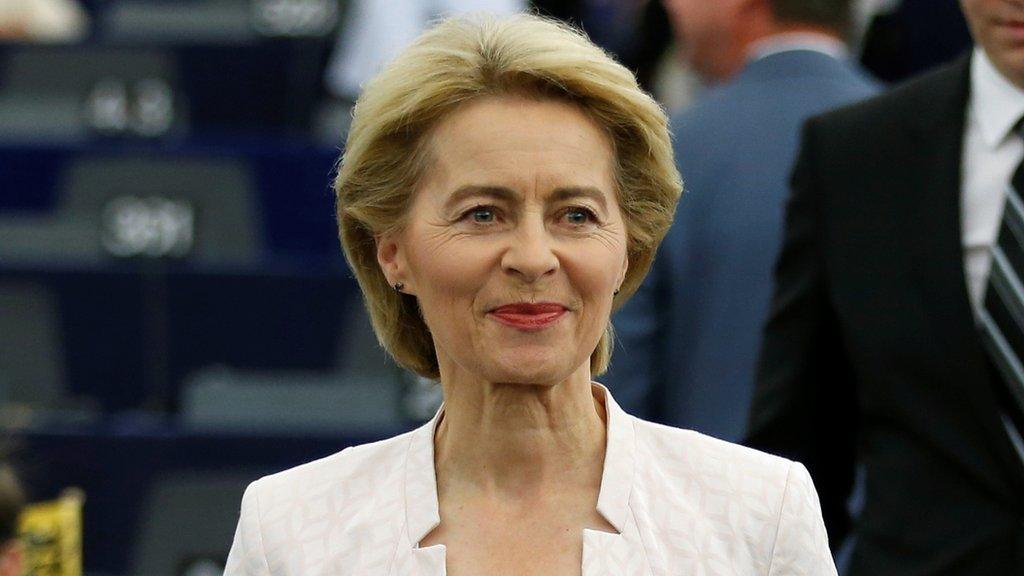Von der Leyen vote: Europe's media welcome EU Commission choice
- Published
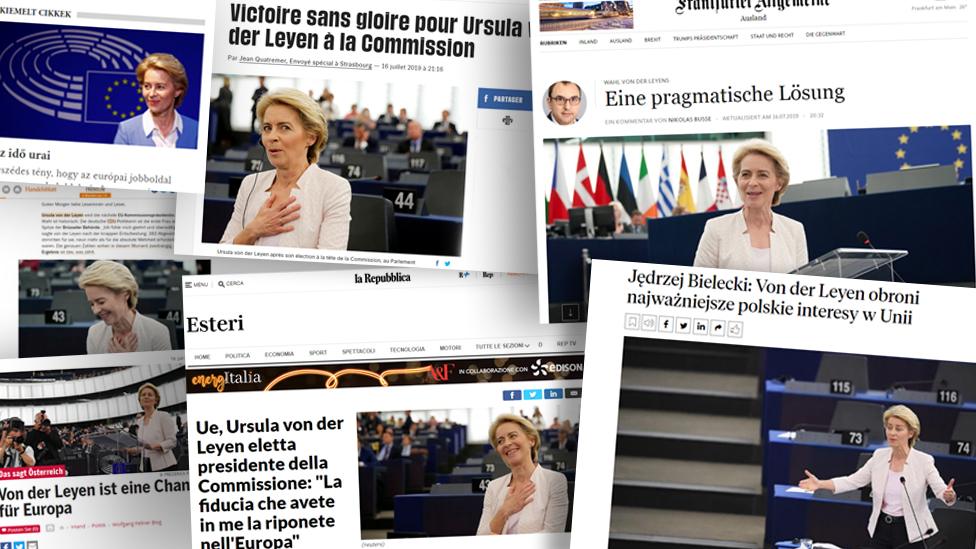
Papers welcome Ursula von der Leyen's narrow win
Most European newspapers welcome Ursula von der Leyen's election as European Commission president while pointing out a slew of tough challenges she now faces.
"It was not easy, and she knew it: her tenacity was rewarded," says Italy's centrist daily La Stampa. "The big electors, Emmanuel Macron and Angela Merkel, sighed with relief. There was no plan B."
The paper says the former German defence minister faces difficult choices while "the European project is being attacked from many sides, from nationalist populists inside to Donald Trump and a constellation of autocrats outside, with the wound of Brexit remaining open".
For German business daily Handelsblatt "the next few years will show whether our continent is willing and able to compete, external with the USA and China - economically, technologically and politically".
Slender victory
Several papers weigh up the implications of her narrow margin of victory.
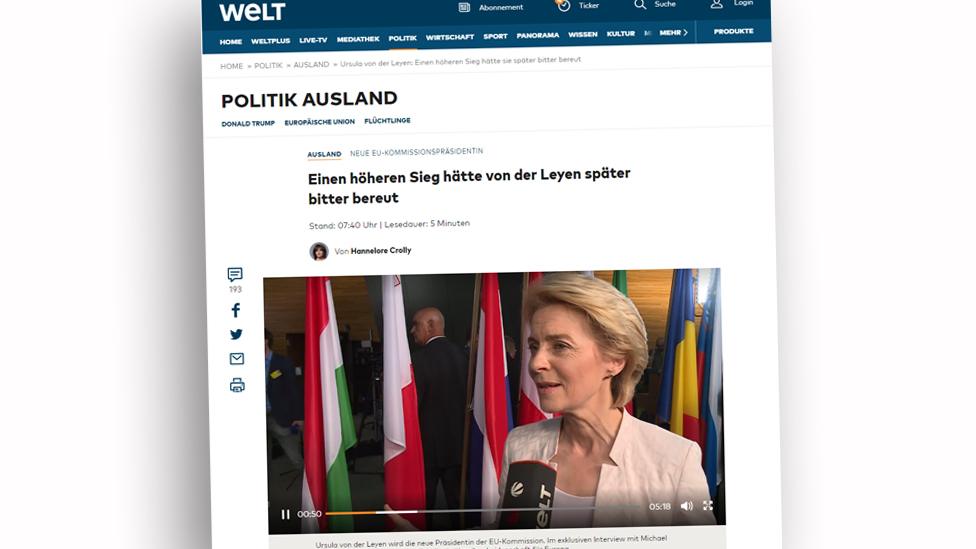
'Wafer-thin' result
For Germany's centre-right Die Welt, "the wafer-thin election result by only nine votes was a surprise, almost a shock, but it will give future EU Commission President Ursula von der Leyen a decisive strategic advantage". A bigger victory would have required extra concessions to "right-wing populists and national conservatives", it says.
"The weak election result reflects one thing in particular: a heavily fragmented parliament in which all the factions have tasted blood."
Italy's liberal La Repubblica believes that her nomination "was the result of a compromise between Germany and France, with consent from the Italian government and the Visegrad bloc countries." It notes that with 51.27% of the parliamentary vote, she had less support than her predecessors.
Poland's conservative Rzeszpospolita points out that all MEPs representing Poland's ruling Law and Justice party (PiS) backed the former German defence minister. This, the paper says, gives Warsaw reasons to hope that "the new European Commission will not resume the ideological crusade, which [Dutch Socialist] Frans Timmermans ran", and that "Brussels will abandon all its fantasies about the formation of a European army and the weakening of Nato".
Positive thoughts
Brighter endorsements for von der Leyen emerge in other newspapers today. Spain's conservative La Razon thinks she came across in a very convincing way in the run-up to the vote, acclaiming her as a "convincing orator".
"Von der Leyen deployed all her heavy artillery in a series of statements with a notably environmental and social character," the Spanish paper says.
"The European Parliament has put aside its misgivings and opted for a pragmatic solution," Germany's centre-right Frankfurter Allgemeine Zeitung says. And the fact that her nationality played almost no role in the preceding debate is "impressive evidence of how EU cooperation has eroded historical mistrust".
"Despite all legitimate criticism of the process of her nomination, EU Commission President Ursula von der Leyen is still an opportunity for Europe!" declares Austria's conservative Oesterreich tabloid.
"Not only because of her personal CV: a mother of seven, a woman of power, fluent in three languages. Von der Leyen is a fervent European. And, above all, she has a vision that she presented yesterday in her 33-minute speech in the European Parliament, very emotional and combative."
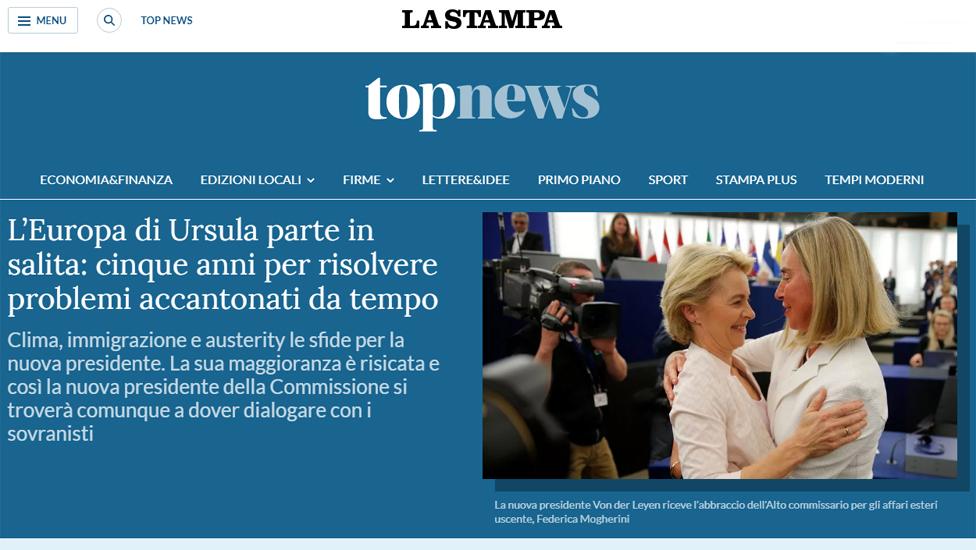
La Stampa: 'There was no plan B'
France's left-wing Libération praises her Strasbourg speech as "accurate, spirited, lively, humane and not without emotion when she was speaking about the European project of the refugee drama".
The next head of the European Commission showed herself to be full of energy, refreshing and willing to avoid doublespeak, in contrast to her predecessor Jean-Claude Juncker, who seemed "prematurely aged" and "worn out", it adds.
Crucial votes
Many European papers point out that von der Leyen owes her victory to a batch of crucial votes garnered from the European Parliament's Eurosceptic wing.
Libération says even though it was a secret ballot, it was clear she relied on the support of Italy's Five Star Movement and Poland's ruling PiS as they had said in advance they were supporting her.
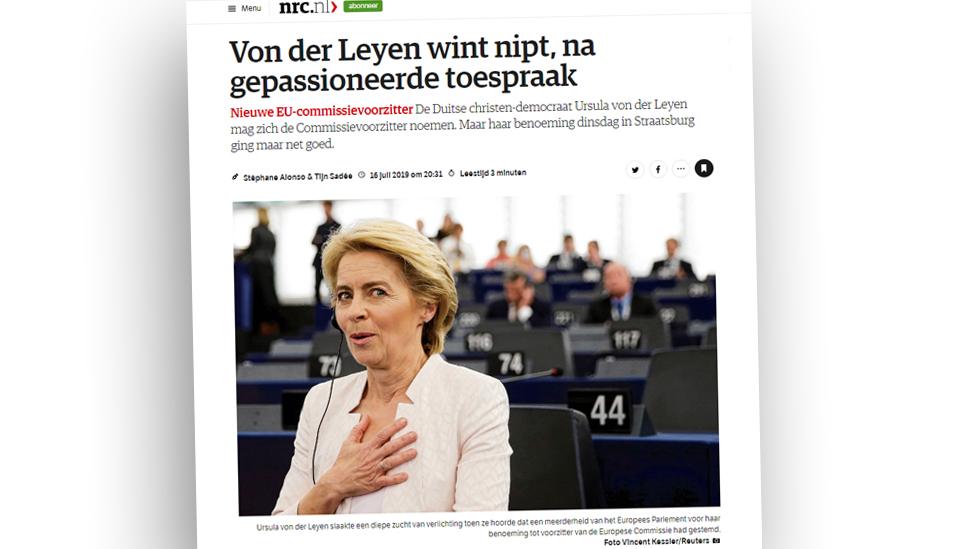
NRC Handelsblad: 'She went for the political centre'
Italy's centrist Il Messaggero points out that Italy's other ruling party, the League, rejected her, a symptom of the divisions in Rome's government.
At the last minute, Ursula von der Leyen decided against making promises to right-wing populists, says Dutch centre-right daily NRC Handelsblad. "Instead, she went for the political centre, with a sharp, personal speech. And by the evening, she could call herself commission president."
Hungary, like Poland, faces battles ahead with Brussels as its ruling nationalist Fidesz party clashed with her predecessor's vision over core EU values.
Hungary's main pro-government mouthpiece Magyar Nemzet is unimpressed.
"The European Union's current set-up cannot produce anything but a politically-correct and completely colourless and odourless Commission, with a leader who knows more about backroom dealings but less about real problems than we do," it says.
BBC Monitoring, external reports and analyses news from TV, radio, web and print media around the world. You can follow BBC Monitoring on Twitter, external and Facebook, external.
- Published16 July 2019
